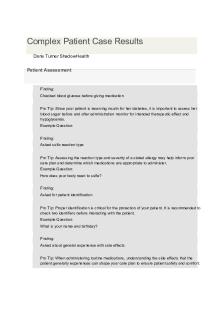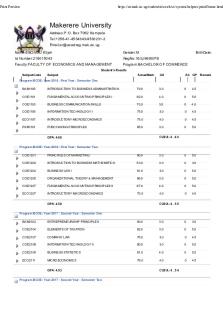2Complex Patient Case Results PDF

| Title | 2Complex Patient Case Results |
|---|---|
| Author | stu Docu |
| Course | Health and Illness Across the Lifespan |
| Institution | Florida State College at Jacksonville |
| Pages | 6 |
| File Size | 130.7 KB |
| File Type | |
| Total Downloads | 30 |
| Total Views | 139 |
Summary
Health and Illness Across the Lifespan...
Description
Complex Patient Case Results Doris Turner ShadowHealth
Patient Assessment
Finding: Checked blood glucose before giving medication Pro Tip: Since your patient is receiving insulin for her diabetes, it is important to assess her blood sugar before and after administration monitor for intended therapeutic effect and hypoglycemia. Example Question: Finding: Asked sulfa reaction type Pro Tip: Assessing the reaction type and severity of a stated allergy may help inform your care plan and determine which medications are appropriate to administer. Example Question: How does your body react to sulfa? Finding: Asked for patient identification Pro Tip: Proper identification is critical for the protection of your patient. It is recommended to check two identifiers before interacting with the patient. Example Question: What is your name and birthday? Finding: Asked about general experience with side effects Pro Tip: When administering routine medications, understanding the side effects that the patient generally experiences can shape your care plan to ensure patient safety and comfort.
Example Question: What medication side effects have you experienced? Finding: Asked about medication allergies Pro Tip: Patients may have allergies that are not included in their documentation, so asking for verbal confirmation can prevent serious adverse events. Example Question: Do you have medication allergies? Finding: Checked vitals before giving medication Pro Tip: Assessing the patient's vitals may impact your care plan and the safe administration of ordered medications. Example Question: Finding: Asked about breathing Pro Tip: As your patient is suffering from pneumonia, it is important to assess breathing status to identify worsening symptoms or life-threatening respiratory complications. Example Question: Have you had breathing problems lately? Finding: RLL with crackles, all other lobes clear to auscultation before medication Pro Tip: Auscultation of your patient's lungs is important to assess for worsening symptoms of her pneumonia. Example Question: Finding: Asked about orientation to place and time
Pro Tip: Many of the patient's ordered medications carry the risk of confusion as an adverse effect; it is also important to assess geriatric patients for the onset of age-related conditions such as dementia. Example Question: Do you know where you are right now? Finding: Asked about comfort Pro Tip: Assessing your patient's comfort level during her hospital stay is an important administrative best practice; addressing her concerns about comfort may enhance her general well-being and the efficacy of treatment. Example Question: Are you comfortable? Finding: Asked about ability to use bathroom Pro Tip: Since your patient is part of the geriatric population, it is important to assess her ability to get to the bathroom and walk independently. Example Question: Do you need help getting to the bathroom? Finding: Asked about mobility Pro Tip: Since your patient is part of the geriatric population, it is important to assess her ability to get to the bathroom and walk independently. Example Question: Do you have problems walking? Finding: Asked about thirst Pro Tip: Thirst can be an important indicator of the patient's general comfort and recent intake. Excessive thirst may be an indicator of dehydration. Example Question: Are you thirsty?
Finding: Checked intake and output before giving medication Pro Tip: Assessing the patient's intake and output may impact your care plan and the safe administration of ordered medications. Example Question:
Patient Monitoring
Finding: Asked about swelling Pro Tip: Swelling can be an indicator of an allergic reaction to medication. Example Question: Have you noticed swelling anywhere? Finding: RLL with crackles, all other lobes clear to auscultation after medication Pro Tip: Auscultation of your patient's lungs is important to assess for worsening symptoms of her pneumonia. Example Question: Finding: Asked about IV site Pro Tip: Assessing the patient's IV site is an important patient comfort consideration and may reduce the risk for IV site complications such as infection. Example Question: How does your IV site feel? Finding: Asked about confusion Pro Tip: Many of the patient's ordered medications carry the risk of confusion as an adverse effect; it is also important to assess geriatric patients for the onset of age-related conditions such as dementia.
Example Question: Do you feel confused? Finding: Checked vitals after giving medication Pro Tip: Assessing the patient's vitals may impact your care plan and the safe administration of ordered medications. Example Question: Finding: Checked blood glucose after giving medication Pro Tip: Since your patient is receiving insulin for her diabetes, it is important to assess her blood sugar before and after administration monitor for intended therapeutic effect and hypoglycemia. Example Question: Finding: Asked about breathing (Available) Pro Tip: As your patient is suffering from pneumonia, it is important to assess breathing status to identify worsening symptoms or life-threatening respiratory complications. Example Question: Have you had breathing problems lately? Finding: Asked about shakiness Pro Tip: Shakiness may be an indicator of low blood sugar, which is a life-threatening adverse effect associated with insulin. Example Question: Do you feel shaky? Finding: Asked about headaches
Pro Tip: Headaches are one of the most common adverse effects associated with venlafaxine. Example Question: Do you have a current headache? Finding: Asked about abdominal pain Pro Tip: Abdominal pain, especially abdominal cramping, is one symptom of pseudomembranous colitis, which is a life-threatening adverse affect associated with ceftriaxone. Your care plan should also include instructions to monitor for these symptoms throughout and shortly after antibiotic treatment. Example Question: Do you have any stomach pain? Finding: Asked about nausea Pro Tip: Nausea is one symptom of pseudomembranous colitis, which is a life-threatening adverse affect associated with ceftriaxone. Your care plan should also include instructions to monitor for these symptoms throughout and shortly after antibiotic treatment. Example Question: Are you feeling nauseated? Finding: Checked intake and output after giving medication...
Similar Free PDFs

2Complex Patient Case Results
- 6 Pages

Case study #4 patient fall
- 3 Pages

Results
- 3 Pages

Patient positions
- 8 Pages

Provisional Results
- 2 Pages

Patient Positioning
- 14 Pages

PATIENT SAFETY
- 15 Pages

Eli Results
- 6 Pages

Results section
- 3 Pages

Patient History
- 2 Pages

My Strength Quest Results
- 2 Pages

Measurement lab results
- 12 Pages
Popular Institutions
- Tinajero National High School - Annex
- Politeknik Caltex Riau
- Yokohama City University
- SGT University
- University of Al-Qadisiyah
- Divine Word College of Vigan
- Techniek College Rotterdam
- Universidade de Santiago
- Universiti Teknologi MARA Cawangan Johor Kampus Pasir Gudang
- Poltekkes Kemenkes Yogyakarta
- Baguio City National High School
- Colegio san marcos
- preparatoria uno
- Centro de Bachillerato Tecnológico Industrial y de Servicios No. 107
- Dalian Maritime University
- Quang Trung Secondary School
- Colegio Tecnológico en Informática
- Corporación Regional de Educación Superior
- Grupo CEDVA
- Dar Al Uloom University
- Centro de Estudios Preuniversitarios de la Universidad Nacional de Ingeniería
- 上智大学
- Aakash International School, Nuna Majara
- San Felipe Neri Catholic School
- Kang Chiao International School - New Taipei City
- Misamis Occidental National High School
- Institución Educativa Escuela Normal Juan Ladrilleros
- Kolehiyo ng Pantukan
- Batanes State College
- Instituto Continental
- Sekolah Menengah Kejuruan Kesehatan Kaltara (Tarakan)
- Colegio de La Inmaculada Concepcion - Cebu



